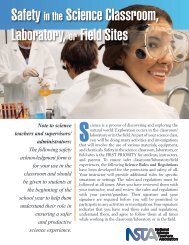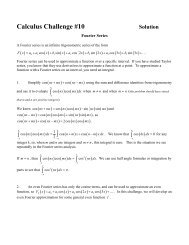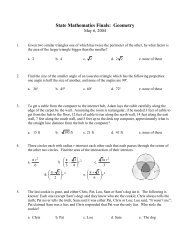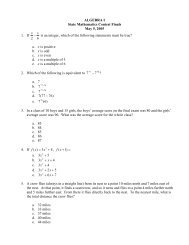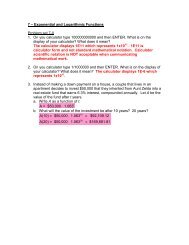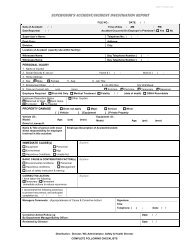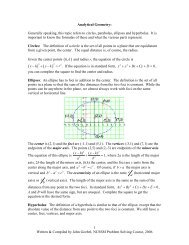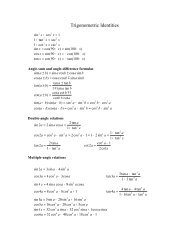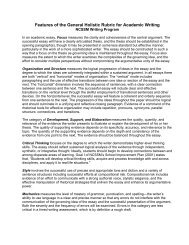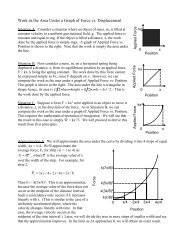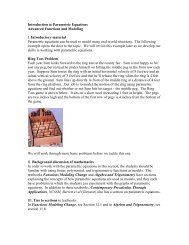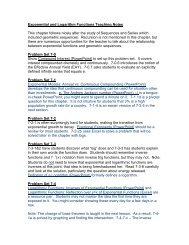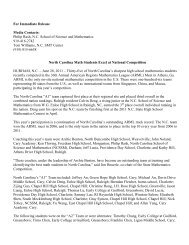NCSSM COURSE CAtAlOG - North Carolina School of Science and ...
NCSSM COURSE CAtAlOG - North Carolina School of Science and ...
NCSSM COURSE CAtAlOG - North Carolina School of Science and ...
Create successful ePaper yourself
Turn your PDF publications into a flip-book with our unique Google optimized e-Paper software.
This course focuses on the study <strong>of</strong> natural Earth processes in order to<br />
underst<strong>and</strong> how these processes have grown interdependent over millennia to<br />
form a life-supporting <strong>and</strong> balanced Earth system. Due to the interdisciplinary<br />
nature <strong>of</strong> this course, the laboratory <strong>and</strong> field components include a variety <strong>of</strong><br />
activities from analysis <strong>of</strong> existing data sets to experimental design.<br />
BI426 AP Environmental <strong>Science</strong> (II)<br />
One trimester<br />
Credit: One unit core biology or core elective credit.<br />
Prerequisite: BI424 AP Environmental <strong>Science</strong> (I).<br />
Meeting pattern: Five periods per week including lab.<br />
This course continues the study <strong>of</strong> the environment with emphasis on the effect<br />
<strong>of</strong> human activity on the Earth’s natural processes in order to consider how<br />
economic development <strong>and</strong> human activity can be practiced in a sustainable<br />
manner. Many <strong>of</strong> the field trips <strong>and</strong> labs are <strong>of</strong>f campus <strong>and</strong> outdoors. Students<br />
who master the concepts covered in both trimesters <strong>of</strong> environmental science<br />
are prepared for the AP Environmental <strong>Science</strong> examination.<br />
NOTE: Due to the variation <strong>of</strong> the residential trimester calendar <strong>and</strong> the <strong>NCSSM</strong><br />
Online semester calendar, BI430 Advanced Topics in Environmental <strong>Science</strong> in<br />
the <strong>NCSSM</strong> Online program is not an acceptable prerequisite for BI426 AP<br />
Environmental <strong>Science</strong> (II) in the residential program.<br />
BI434 AP Biology (I)<br />
BI436 AP Biology (II)<br />
BI438 AP Biology (III)<br />
One trimester each<br />
Credit: One unit each core biology or core elective credit.<br />
Prerequisite: Senior st<strong>and</strong>ing <strong>and</strong> completion <strong>of</strong> a general biology course <strong>and</strong> a<br />
chemistry course with a final grade <strong>of</strong> B or higher. Juniors who have completed<br />
a general biology course <strong>and</strong> a chemistry course with a grade <strong>of</strong> A or higher<br />
<strong>and</strong> permission <strong>of</strong> the Dean <strong>of</strong> <strong>Science</strong> may also qualify.<br />
Meeting pattern: BI434 – four periods per week including lab, BI436 – five periods<br />
per week including lab, BI438 – four periods per week including lab.<br />
This course is a survey <strong>of</strong> all areas <strong>of</strong> biology. It is divided into three terms. In<br />
BI434 students investigate molecular <strong>and</strong> cellular biology as well as Mendelian<br />
genetics. BI436 includes DNA science, evolutionary biology, <strong>and</strong> phylogeny.<br />
BI438 covers organisms <strong>and</strong> populations. This course has a strong laboratory<br />
emphasis, which includes the twelve laboratories suggested by the AP. Students<br />
may enroll in <strong>and</strong> receive credit for any, or all, <strong>of</strong> these one-trimester courses.<br />
67



